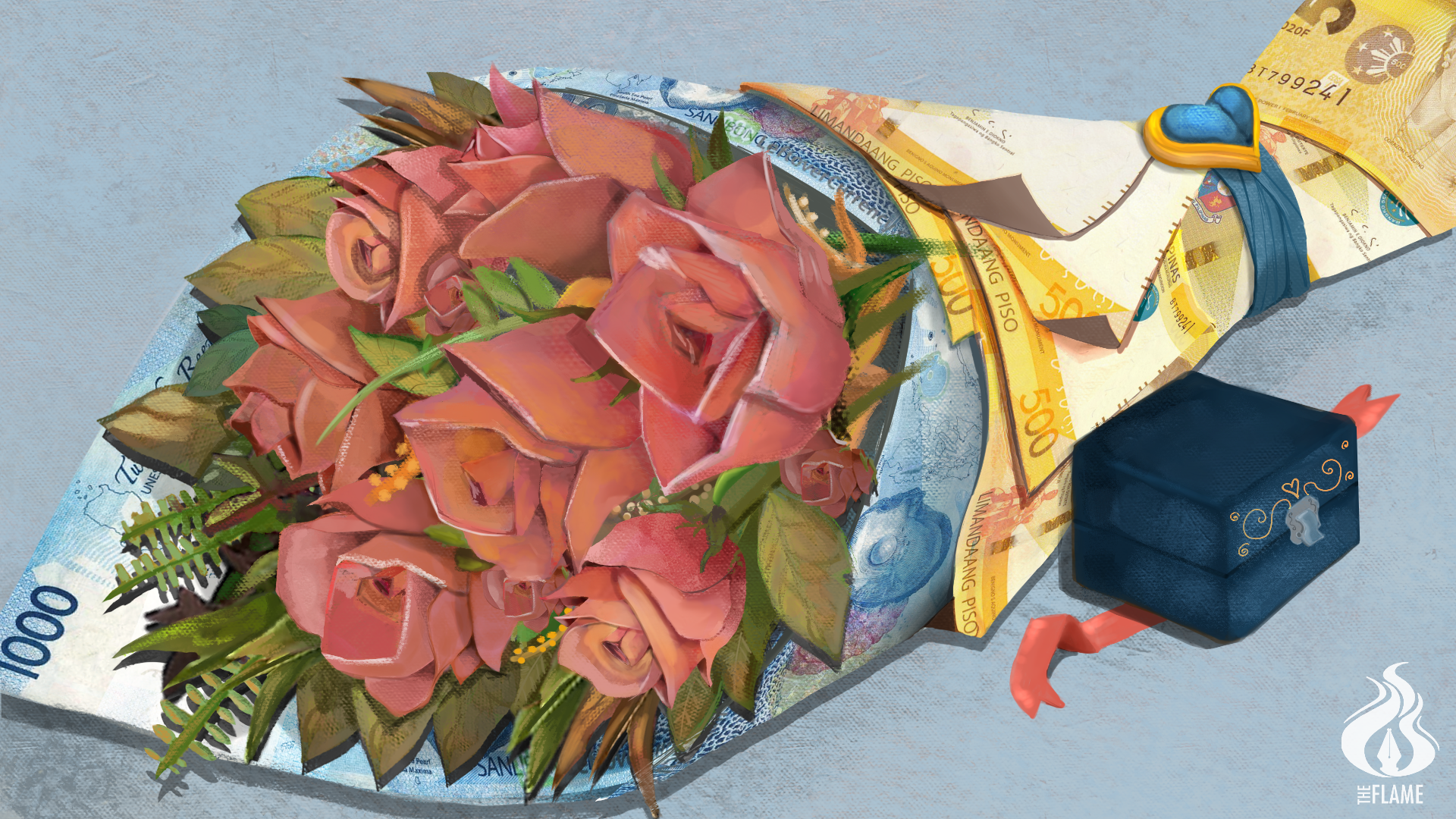
It was a Sunday afternoon just two weeks before Valentine’s Day. Roey Lagasca walked towards the nearest automated teller machine (ATM) just below his dorm. While waiting, Lagasca calculated his weekly expenses.
For Lagasca, a new week means a new set of expenses to budget.
As soon as the ATM dispensed his allowance, he went back to his dorm, pulled out his phone, and began budgeting. He separated his weekly allowance of P3,000 for food, laundry, and another for his emergency funds.
The remaining amount will be used for the upcoming Valentine’s Day.
Looking at his phone’s calendar, he happily said, “I still have time to save up for Valentine’s,” and continued canvassing for the perfect Valentine’s gift for his girlfriend.
Unexpected
Valentine’s Day is more often than not a day filled with flower bouquets, red balloons, and heart-shaped sweets. Thomasians would usually give out handmade gifts to express their appreciation to their professors and peers. Couples would also spend time in the so-called Lover’s Lane, an area in the Benavides Park that has heard countless sweet nothings and has witnessed a myriad of mushy moments.
While the day is filled with affectionate gestures and words of endearment, it also has bittersweet memories and unexpected experiences.
Behavioral science senior Megan Ang once witnessed a Valentine’s Day gone wrong. While she was spending time in Quadricentennial Park, a guy caught her attention.
“I noticed this guy with a bouquet. He was always looking at his phone. After what seemed like an hour, I saw him again putting his phone back in his pocket. He then walked away with slumped shoulders and threw his bouquet,” Ang recalled.
Lagasca, an Asian studies junior, had a similar, unexpected Valentine’s Day experience. According to him, there was a time when he bought flowers for a girl only to find out it was not enough, “After I gave her the flowers, she told me [that] it was the worst Valentine’s because I did not meet her expectations.”
Although Valentine’s Day is all about love, it is also that one day where couples feel pressured to spend a lot on gifts or for dates, he added.
Emotional investment
Preparing for Valentine’s Day – widely considered as the right time to express love – is no easy feat, let alone finding the perfect gift. However, the love month might be a strategically good deal for entrepreneurs.
As the day comes closer, dozens of advertisements, promotional offers, catchy quotation cards, and Valentine’s Day specials invade one’s social media news feed and even mainstream media reports. This further leads to a high demand for material things, making the occasion a good opportunity to increase sales and to persuade people to part with their hard-earned money.
“Companies capitalize on emotional investment, and they push consumers via aggressive promotion and advertising by making people feel the need to purchase,” University of Santo Tomas economics professor Kristine April Suin told The Flame.
Artlet economics professor Danielle Canto said the occasion has become commercialized and has become associated with “lavish spending on gifts and one-of-a-kind experiences.”
“Marketing love may make relationships appear fake and superficial,” Canto said.
Valentine’s Day expectations, Canto added, are rooted in the associated consumerism: “If a partner’s expectations aren’t satisfied, this might place a strain on the relationship.”
Canto and Suin said societal pressure also plays a huge factor in one’s consumer behavior in a capitalist environment.
“For the seller, special occasions are an excellent opportunity to capitalize on the emotions of people to purchase and from a consumer perspective, it’s the person’s chance to be “part of the crowd,” Suin said.
Love in the time of COVID
Being in love is one thing, and spending for it is another. Gifts, flowers, chocolates, and fancy dates all require time, effort, and above all, money. So how do students who still rely on allowances given by their parents budget their Valentine’s Day expenses?
Ang recalled saving at least P2,000 from her weekly allowance for Valentine’s Day two years ago. But in 2021, she spent less as that was the first time she celebrated the occasion during the pandemic. She decided to use the unspent amount for this year’s Valentine’s Day.
During her last Valentine’s date, communication junior Aidee So spent P1,000 only on food since she did not give gifts to her partner. Had she decided to buy a gift, she would have spent P1,000 more.
“I have to save up because I need to budget my money,” Aidee said.
Being in a relationship for eight years, Asian studies junior Angelo Paulino is no stranger to Valentine’s Day expenses. Paulino shared that in 2019, he initially planned to spend P,3000 for the day but ended up spending only a third of the amount.
“[We] agreed that we should spend more on our anniversary instead of Valentine’s,” he said.
When the pandemic struck, going out no longer seemed to be an option, and allowances were halted. That was when Paulino chose to spend the day on a video call with his girlfriend. They just decided to send each other love letters, allowing them to demonstrate love and affection without incurring expenses.
Lagasca is aware that Valentine’s Day can be a very costly event but he did not mind spending a lot of money for the occasion. He explained that budgeting is the key, especially for students who used to live in dormitories like him. Lagasca, who hails from the northern city of Baguio, explained that he needed to limithis expenses since he was away from his family.
Lagasca budgeted his weekly allowance by setting caps for his food, usually at P200, personal expenses, and Valentine’s Day-related costs, for which he allocated P1,000 to P1,500.
“But generally, I don’t think you have to spend that much, it just depends on the person if they will appreciate it no matter how big or small the effort is,” Lagasca said.
“It’s always the intention [that matters],” he added.
What really counts
Can you put a price tag on love?
Lagasca believes fancy dates and gifts will never be expensive to someone who wants to make his lover feel appreciated.
“If you buy flowers for someone you love, admire, or really appreciate, that’s not expensive because love has no price tag. It’s hard to put a price on love,” he said.
Paulino expressed a different view, saying one can show love without spending money. He admitted spending a lot during the first few years of his relationship with his girlfriend.
“Over time, I’ve grown to realize that the worth of the gifts we give is not determined by [their] monetary value, but of the thought and effort put into that gift. A present that is made by your partner warrants more merit than one with a hefty price tag,” Paulino said. F – Patricia Mae O. Rebong



